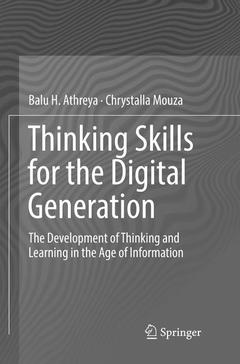Description
Thinking Skills for the Digital Generation, Softcover reprint of the original 1st ed. 2017
The Development of Thinking and Learning in the Age of Information
Authors: Athreya Balu H., Mouza Chrystalla
Language: English
Subject for Thinking Skills for the Digital Generation:
94.94 €
In Print (Delivery period: 15 days).
Add to cartPublication date: 07-2018
Support: Print on demand
Approximative price 94.94 €
In Print (Delivery period: 15 days).
Add to cartPublication date: 01-2017
179 p. · 15.5x23.5 cm · Hardback
Description
/li>Contents
/li>Biography
/li>Comment
/li>
Includes practical guidelines for coping with technology and using technology to expand thinking
Provides a comprehensive perspective that is relevant to all professionals working and interacting with young learners
Presents a scholarly review of what we know about thinking, learning, and electronic media

